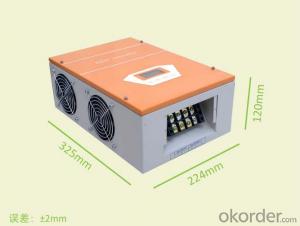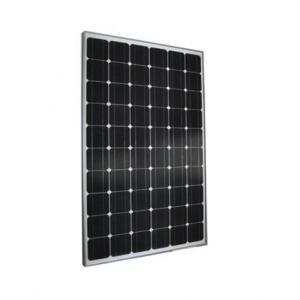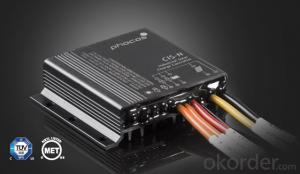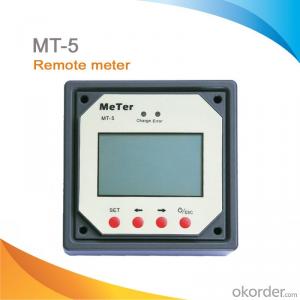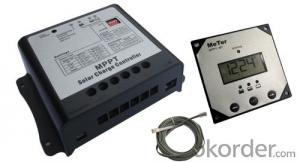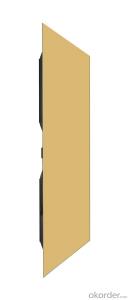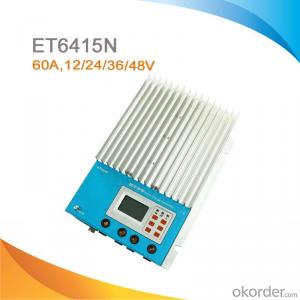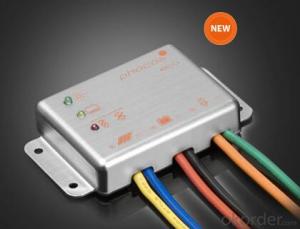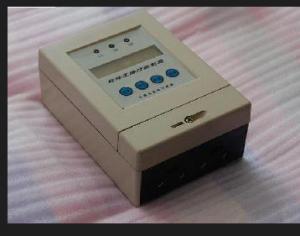Solar Charge Controller 3KW-MPPT Charging Function
- Loading Port:
- Shanghai
- Payment Terms:
- TT or LC
- Min Order Qty:
- 1 unit
- Supply Capability:
- 10000 unit/month
OKorder Service Pledge
OKorder Financial Service
You Might Also Like
I. PRODUCT INTRODUCTION
Solar controller is control device which can control solar panel and transform solar energy into electricity then store to the battery bank. Solar controller is the most important part in off-grid system, whose performance has much effect on life expectancy and operation of the whole system, especially the battery expectancy. Or battery service life will be shortened by over charge or over discharge.
II. PERFORMANCE FEATURES
Superior military-grade components to ensure the product stability.
Perfect protection function, thus the system has higher reliability.
Check and set all operation parameters as requirement from LCD display.
PWM stepless unload mode, which burn the excess power into Dump load, making the battery charging in best status.
III. APPLICATION AREAS
Standalone Photovoltaic power station
Standalone Domestic household photovoltaic power system
Mobil communication base stations, expressway and other non-residential regions.
Coastal islands, remote mountainous, border posts for regions shortage of or without electricity.
Government demonstration projects, landscape lighting project etc.
IV. 3KW TECHNICAL PARAMETERS
Product model | WS30-48-N00 | WS30-96-N00 | WS30-110-N00 | WS30-120-N00 | WS30-220-N00 |
Rated battery power | 48V | 96V | 110V | 120V | 220V |
Rated solar input power | 3kW | 3kW | 3kW | 3kW | 3kW |
Floating charge voltage | 58V | 116V | 133V | 145V | 266V |
Max Open Circuit Voltage | 100V | 200V | 230V | 250V | 458V |
Dimensions (L x W x H) | 442×307×172 mm | ||||
Net weight | 7kg | ||||
Display mode | LCD | ||||
Cooling | Fan | ||||
Protection level | IP20(Indoor) | ||||
Quiescent current | ≤20 mA | ||||
Protection functions | Battery over charge; battery anti-reverse-connection; solar reverse charge protection; solar anti-reverse-connection; lightning protection. | ||||
Ambient temperature | -20~+55℃ | ||||
Ambient humidity | 0~93%, without condensing | ||||
Working altitude | ≤4000m | ||||
In order to serve our customers better, our company can adjust parameter configuration according to customer’s requirement. | |||||
V. APPENDIX
Optional Functions | ||
Ø Temperature compensation function | Ø Dry-connect output signal function | Ø RS communication function |
Optional Accessories | ||
Ø Ethernet Module | Ø GPRS | Ø SD card storage module |
Ø RS485-USB converter | Ø RS485-RS232 converter | Ø RS232-USB converter |
Friendly reminder: Customers, who will order the solar controller, need to provide the following information | ||
Ø Rated battery voltage | Ø Rated solar power | Ø With or without additional functions |
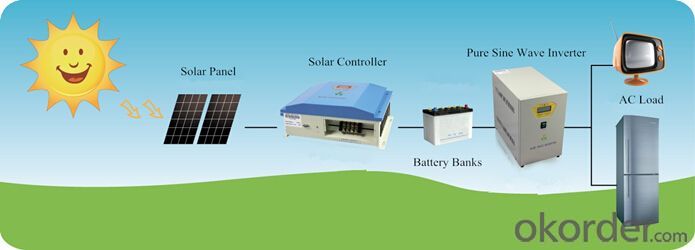
- Q:Can a solar controller be used with MPPT (Maximum Power Point Tracking) technology?
- Yes, a solar controller can be used with MPPT (Maximum Power Point Tracking) technology. In fact, MPPT technology is often incorporated into solar controllers to optimize the power output from solar panels by tracking and adjusting to the maximum power point of the panel. This allows for more efficient energy conversion and increased overall system performance.
- Q:Can a solar controller be used with solar panels that are connected to a solar heating system?
- Solar panels connected to a solar heating system can indeed be used with a solar controller. The purpose of this controller is to regulate and optimize the energy flow between the panels and the connected system. When it comes to a solar heating system, the controller will constantly monitor the system's temperature and adjust the energy flow accordingly in order to maintain the desired temperature. By doing so, it enhances the efficiency and effectiveness of the solar heating system. Thus, a solar controller is a crucial component that can be utilized alongside solar panels in a solar heating system.
- Q:What is the maximum voltage drop allowed in the system by a solar controller?
- The maximum voltage drop allowed in the system by a solar controller varies depending on the specific controller model and manufacturer. It is recommended to consult the product's technical specifications or user manual for accurate information on the maximum voltage drop tolerances.
- Q:Can a solar controller be used with both battery-based and grid-tied solar systems?
- Yes, a solar controller can be used with both battery-based and grid-tied solar systems. A solar controller, also known as a charge controller, is responsible for regulating the flow of electricity from the solar panels to the batteries or grid. In a battery-based solar system, the controller ensures that the batteries are charged efficiently and prevents overcharging or damage to the batteries. In a grid-tied solar system, the controller helps regulate the electricity flow from the solar panels to the grid, ensuring that the energy is being used efficiently and conforming to the grid's requirements. Therefore, a solar controller can be used in both battery-based and grid-tied solar systems to optimize energy production and usage.
- Q:What is the typical standby power consumption of a solar controller?
- The standby power consumption of a solar controller can vary depending on the specific model and brand, but most modern controllers have a very low standby power consumption. On average, these controllers consume as little as 0.1 watts to about 1 watt when not actively controlling the solar system. Efficient design and advanced power-saving technologies enable these controllers to achieve such low standby power consumption. They are designed to minimize energy waste and only use a minimal amount of power when not actively controlling the solar system. It is important to consider that standby power consumption may also be influenced by factors like the size of the solar system, the complexity of the controller's features, and any additional accessories connected to the controller. Thus, it is always advisable to consult the manufacturer's product specifications for accurate information on the standby power consumption of a specific solar controller.
- Q:How does a solar controller prevent overvoltage in the system?
- A solar controller prevents overvoltage in a system by continuously monitoring the voltage levels of the solar panels. It regulates the charging process by adjusting the current flow to the batteries, ensuring that the voltage remains within a safe range. If the voltage exceeds the set limit, the solar controller will limit the current or cut off the charging process altogether, preventing any potential damage to the system.
- Q:What is the maximum charging current that a solar controller can handle?
- The maximum charging current that a solar controller can handle depends on its specifications and capabilities. Different solar controllers have different maximum charging current ratings, typically ranging from around 10 amps to 60 amps or more. It is important to consult the manufacturer's specifications or product documentation to determine the specific maximum charging current for a particular solar controller model.
- Q:Can a solar controller be used with a solar-powered gate opener?
- Yes, a solar controller can be used with a solar-powered gate opener. The solar controller helps regulate and optimize the charging of the batteries connected to the gate opener, ensuring efficient and reliable operation of the gate system.
- Q:Can a solar controller be used with a solar-powered marine system?
- Yes, a solar controller can be used with a solar-powered marine system. A solar controller regulates the charging and discharging of batteries connected to a solar panel system, ensuring optimal performance and preventing overcharging. This functionality is essential for maintaining and managing the power supply in a solar-powered marine system, making a solar controller a valuable component in such applications.
- Q:Can a solar controller be used with solar panels of different brands?
- Yes, a solar controller can be used with solar panels of different brands as long as the voltage and current ratings of the panels are compatible with the controller. The controller's main function is to regulate the charging process and protect the batteries, regardless of the brand of the solar panels being used.
1. Manufacturer Overview |
|
|---|---|
| Location | |
| Year Established | |
| Annual Output Value | |
| Main Markets | |
| Company Certifications | |
2. Manufacturer Certificates |
|
|---|---|
| a) Certification Name | |
| Range | |
| Reference | |
| Validity Period | |
3. Manufacturer Capability |
|
|---|---|
| a)Trade Capacity | |
| Nearest Port | |
| Export Percentage | |
| No.of Employees in Trade Department | |
| Language Spoken: | |
| b)Factory Information | |
| Factory Size: | |
| No. of Production Lines | |
| Contract Manufacturing | |
| Product Price Range | |
Send your message to us
Solar Charge Controller 3KW-MPPT Charging Function
- Loading Port:
- Shanghai
- Payment Terms:
- TT or LC
- Min Order Qty:
- 1 unit
- Supply Capability:
- 10000 unit/month
OKorder Service Pledge
OKorder Financial Service
Similar products
New products
Hot products
Hot Searches
Related keywords
